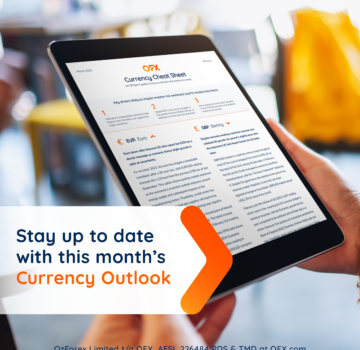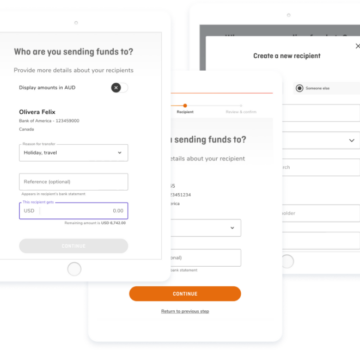Market volatility can make you question when is the best time to transfer currency. How do you anticipate what direction exchange rates will move? What factors impact exchange rates and play into market volatility? If these questions are swirling in your head, rest assured, we have the answers. In part two, of this four-part series, we cover how economic policies impact foreign exchange rates and what you can do to help plan your FX needs.
FX and economic policy
Economic or Monetary policy decisions are often regarded as the main factor influencing foreign exchange (FX) rates. Central banks, like the Federal Reserve, use monetary policy to manage fluctuations in the economy and keep prices stable. In this blog, we will discuss economic policy’s impact on FX rates and what monetary policy decisions you can look out for that may indicate volatility is on the horizon.
We connected with Treasury OFXpert, Isaac Figueroa, to discuss central bank policy and how it impacts FX rates. Central bank decisions like interest rate increases or decreases, are made with a focus on managing the amount of money in the economy at any given time. According to the International Monetary Fund, “The basic approach is simply to change the size of the money supply.”* In simple terms, this means a country’s central bank policymakers are intentionally manipulating the monetary supply, availability of credit, and cost to borrow money.
As a result, economic policy decisions that impact monetary supply can also change the value of that country’s currency, meaning its exchange rate. OFXpert Isaac, gave us an example of this in the real world, “During the 2008 financial crisis, the United States used Quantitative Easing. The Federal Reserve wanted to help the US economy during the market collapse so they bought many government bonds and gave a lot of money to the banks. The goal was to make it easier for banks to lend money and for people and businesses to borrow money. This was supposed to help the economy grow.” As a result of the Quantitative Easing by the Federal Reserve in 2008, the USD’s exchange rate rose slightly, even during the extreme financial crisis felt by the nation.
Ready to start transferring with OFX? Register now
Interest rates and currency exchange
Interest rates are one of the economic policies that, generally, hit closest to home for most of us. With interest rate hikes being the global norm in the current economic environment, they are not only important to us as market participants, but also one of the most prominent ways that central banks use monetary policy. Central banks often implement rate hikes when an economy is growing too fast towards hyperinflation. The interest rate increases deter consumers from borrowing more money and effectively slow spending. In the reverse scenario, when the central bank decreases interest rates it promotes borrowing and spending in a slow economic environment.
The raising or lowering of interest rates impacts exchange rates, as higher interest rates generally increase the value of that currency. Higher interest rates usually attract foreign investment into the economy because it allows investors to earn a greater return when interest rates are higher. For example, if the interest rate in the US is at 5.5% while the Eurozone interest rate sits at 4%, a market participant with euros in their bank account may transfer that money to US dollars where they can earn 1.5% more in interest. This can then increase demand for the country’s currency. On the other hand, lower interest rates are less attractive for foreign investment and decrease the currency’s value in relation to competing currencies.
Increasing and decreasing interest rates to manage inflation and borrowing costs in any given country, also affects exchange rates by increasing or decreasing the demand for that currency. So, what does this mean for you and your FX needs? Simple, OFXpert Issac, suggests that you follow not only your home country’s monetary policy decisions but also stay up to date on other major countries’ policies as well. This means keeping your eye on your business’s top two currency pair’s monetary policies such as the Federal Reserve or the Bank of England’s (BoE) policy decisions, especially interest rate fluctuations. If the BoE announces an interest rate hike and you have pounds, it may mean that the GBP/USD pair will increase, indicating that now could be a good time to transfer your pounds to US dollars at this favourable rate.
Being in the know on monetary policies can help you prepare for market volatility and time your money transfers to fit your payment needs. Now that we have covered how interest rates impact FX markets and can drive volatility, let’s dive deeper into the effect central banks have on FX.
The most important economic factor impacting foreign exchange is interest rates.” – Treasury OFXpert, Isaac Figueroa
Central banks and foreign currencies
Let’s cover another way that economic policy influences the rate of exchange, central banks intervention in the market. This is when central banks buy and sell foreign currencies. When a central bank buys a foreign currency, it increases demand for it, strengthening the currency. When a central bank sells a currency, it reduces demand for it, weakening the currency.
A real-world example of this is the Swiss Franc (CFH) in 2010. The CHF became very strong compared to other currencies like the USD or EUR, and this strength caused problems for Switzerland. It made Swiss materials more expensive for other countries to purchase, hurting Swiss exporters. The Swiss National Bank (SNB) intervened to fix this issue. “One of the things the SNB started to do was buy euros and sell Swiss Francs. This helped to ensure that the CHF didn’t continue to strengthen and the EUR buoyed to a similar level,” OFXpert Isaac said.
When central banks trade foreign currencies they can impact the strength on a large scale. This means that a central bank’s appetite for a given currency can also influence the rate of exchange drastically.

Staying ahead of rate fluctuations
So you’re probably asking what can you do to prepare yourself for fluctuating FX rates due to economic policy. Working with an OFXpert can help you understand the current currency climate and provide you with tools to help you prepare for rate fluctuations and secure the best rate for your business. Some of these tools include:
- Forward Contracts- Forward Contracts are a ‘buy now, pay later’ option for businesses trying to take advantage of a positive rate today on a payment that needs to be paid in the future.
- Currency Outlook- Our weekly and monthly currency outlook compiles our treasury expert’s outlook in combination with key currency shifts and global news, like politics, to lay out a comprehensive look into projected currency fluctuations. Stay in the loop.
- Risk Calculator- Have you ever experienced exchange rates shifting between the time you receive an invoice and its due date? Use our risk calculator to determine the impact shifting market exchange rates could have on an example invoice. This is not a quote, it’s designed to help you understand the impact of currency fluctuations.
- Rate Alerts- Stay on top of moving markets with OFX rate alerts. This tool provides you with personalised market rate alerts directly to your inbox. Our currency experts will monitor the ever-changing market for you.
Leveraging OFX’s easy-to-use tools, in combination with support from a trusted OFXpert, can help your business plan for and factor in FX volatility, no matter what central banks decide to do.
There are many different factors affecting currency exchange rates, we have covered two significant ones, central banks and interest rates. Want to learn more about what causes market volatility? Stay tuned for the next instalment in this series where we will discuss how current events also impact exchange rates and what you can do to help protect your bottom line.
Interested in learning more about how OFX can help you navigate the FX market? Contact an OFXpert today.
See how Forward Contracts can help to protect you against market moves
Now you know more about hedging, get to know our Forward Contracts and try them for yourself.
If you book a Forward Contract, it may mean losing out if the market rate improves because you’re contracted to settle at the agreed rate. Read more. Forward Contracts are not available for personal clients in Hong Kong.
*https://www.imf.org/en/Publications/fandd/issues/Series/Back-to-Basics/Monetary-Policy
Move your money with Finder’s top International Money Transfer service today. Our OFXperts can help you get your money where you need it quickly, safely, and seamlessly. Contact us.
IMPORTANT: The contents of this blog do not constitute financial advice and are provided for general information purposes only without taking into account the investment objectives, financial situation and particular needs of any particular person. UKForex Limited (trading as “OFX”) and its affiliates make no recommendation as to the merits of any financial strategy or product referred to in the blog. OFX makes no warranty, express or implied, concerning the suitability, completeness, quality or exactness of the information and models provided in this blog.



